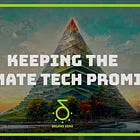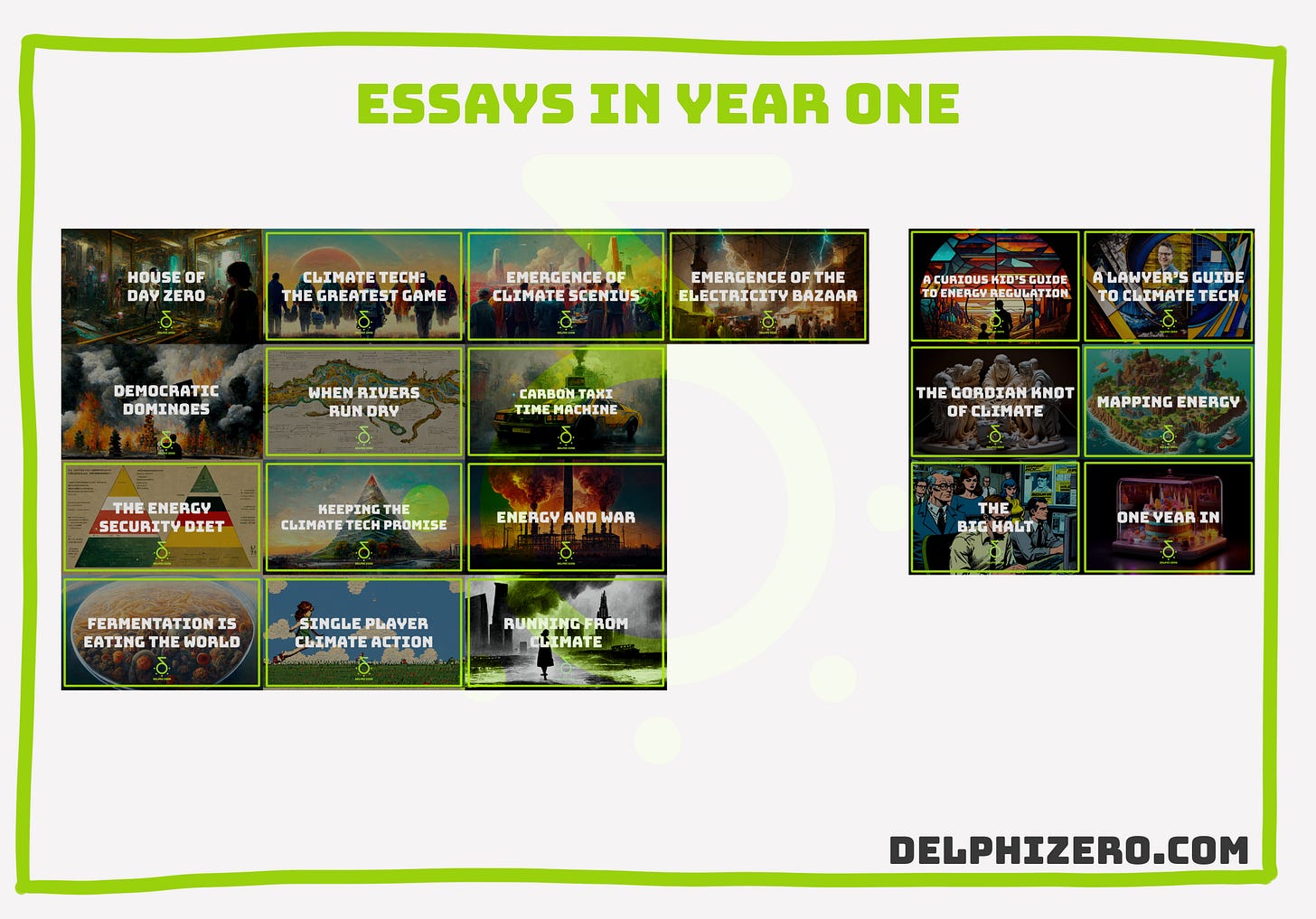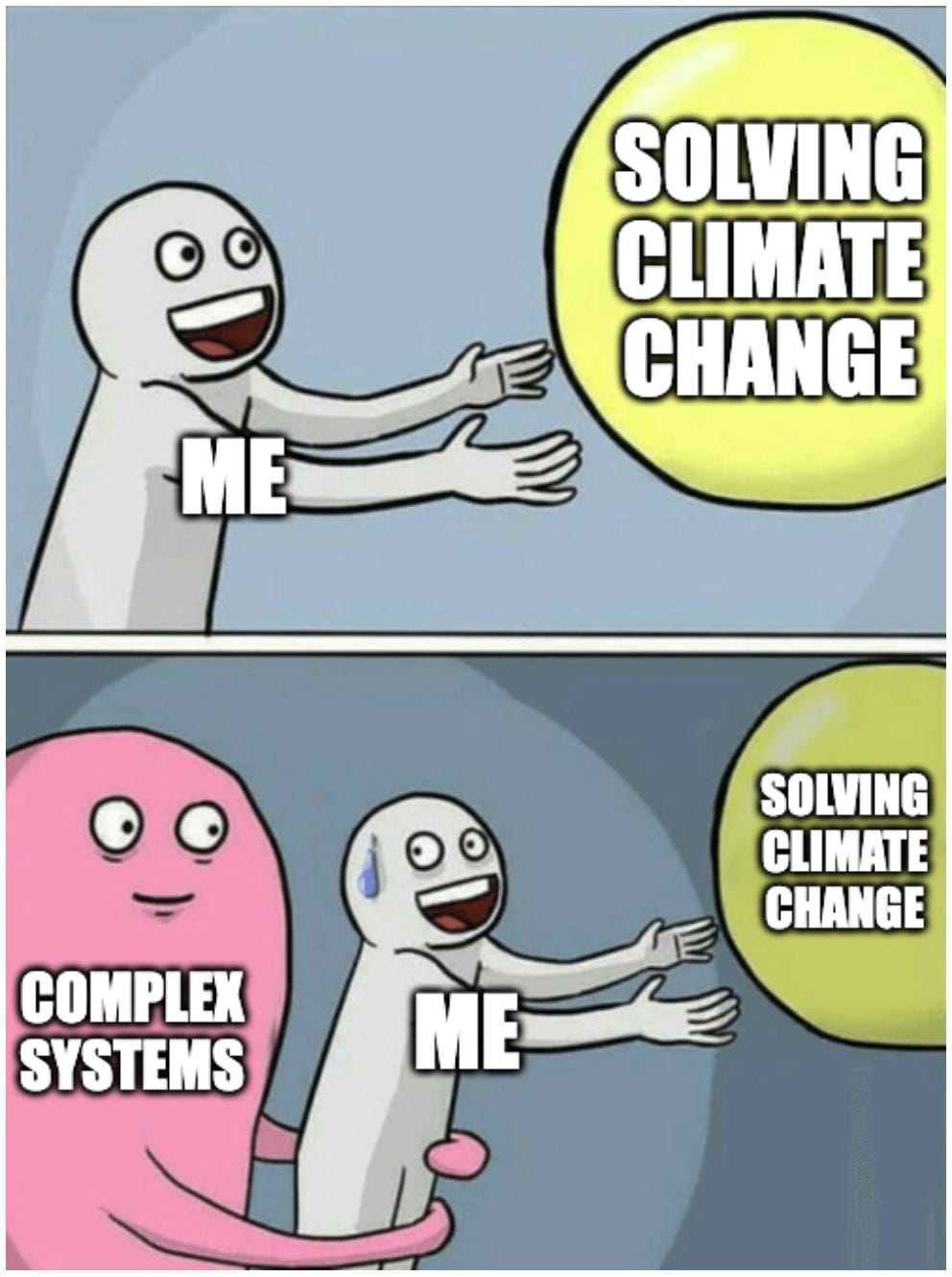Delphi Zero: One Year In
Reflections, Learnings, and Cake 🎂
🤘 Heya to 31 new readers who joined! We are 835 climate buddies now 🌳
Delphi Zero explores topics in climate, energy, and everything in between.
Looking back at the past 365 days it was a wild wild ride on so many levels.
You probably ask yourself: “How the hell did we get here?” I certainly do.
Today’s essay is a special one since I want to write about the first year of the Delphi Zero project. I’ll answer the most frequent questions I receive on a regular basis.
If you’re reading this, please know that I truly appreciate you. Thanks a lot 🙏
Delphi Zero: One Year In
By Art Lapinsch
This essay should be consumed like a snack buffet.
Scan everything and then dig into the sections that are of particular interest to you.
If you’re not hungry, grab a cup of coffee and go about your day ☕️
How Did My Climate Journey Start?
Everything changed when Russia invaded Ukraine.
As a war refugee myself and person with Eastern European heritage, this one hurt a lot. Luckily, a good friend of mine challenged me to funnel my anger into something productive. After going down the European security policy rabbit hole and seeing Europe’s dependence on Russian fossil fuel imports, a question crystalized: How can countries become more resilient from an energy perspective?
I started learning about energy, climate, and security policy 🔋🌳🛡
One of the more obvious intersections of these three areas was climate tech. Eventually, I applied with this letter to become a student of Energy Law at the Technical University of Berlin:
Dear Selection Committee,
The current war in Ukraine changed my life.
I was born in the Soviet Union, and my parents escaped the economic downfall by moving to Yugoslavia. In 1992, we were forced to flee the Yugoslavian Civil War as refugees. My mother is Russian, my father is Latvian, and we have many friends in Ukraine. I’m an Austrian citizen and a European at heart. This war in Ukraine is very personal to me.
When the Ukraine war started on February 24th, it was the first time in my life that I felt the strong combination of anger, helplessness, and desire to resist. First, I created a website (ukraina.guide) for refugees of the Ukraine War - a collection of helpful links for people in need. It was the least I could do. Two weeks later it was done and I started following the news cycle. What really surprised me was Germany’s slow and restrained response to the war.
I continued reading about the policy implications of Germany’s Ost-Politik, their approach of “Wandel durch Handel”, and their eventual reliance on energy imports from Russia. It clicked.
Energy Policy = Security Policy
Since Germany is an economic and political powerhouse within the EU, its energy-political path dependence turned out to be a liability for the entire European community. This was fascinating and scary at the same time. The door to the rabbit hole opened up right in front of my eyes.
What followed was self-directed research into systems thinking, the fundamentals of energy systems, and climate tech. All pieces started clicking into place and it crystallized what I should focus on in the coming years: playing my part in solving the climate and energy crisis.
This crisis checks many boxes for me: (1) it is the biggest challenge of our generation, (2) it has huge ramifications on national and international security, and (3) it presents a colossal entrepreneurial opportunity. The world’s energy transition is the key to unlock our net zero future and the de-carbonization of the grid has to be one of its main drivers.
On top, all complex systems have inertia. To change such a complex system one must push many leverage points at once. On a societal level, this means activating policymakers, the market, and civic leadership. I understand the latter two and am determined to grasp the dynamics of policymaking and regulation.
The syllabus and faculty staff of this master’s degree look like the perfect conduits to solving the outlined challenges above. Hence, I would love to receive this world-class education, learn from my peers, and start playing a small part in Europe’s energy transition. I have a feeling that the 2022 cohort will be a very special one.
I dedicated the past decade of my life to tech startups. First, as a venture developer, then as a startup founder, and most recently as an executive in a large tech company. I could have continued on this path, but I can’t. I see it as my duty to play a small part in our journey to Net Zero. The next decade of my life will be dedicated to the climate and energy crisis.
Arguably, there has been no better time to study energy systems and the laws that govern them. The clock is ticking and the situation is unfolding. In Ukraine, in Europe, and on our planet as a whole. It’s time to act.
I would be extremely grateful if you would give me the chance to participate in this unique program and start playing my part in solving the climate and energy crisis.
Thank you,
Art Lapinsch
Looking back, my sabbatical was an opportunity to sit “idle” while waiting for the right thing. Climate was that thing for me.
I could have never predicted it but I knew it when I saw it.
Why Start a Climate Newsletter?
You might ask: Why start a newsletter when there are already millions of them?
Good question! Here’s my answer:
Delphi Zero is born out of personal frustration.
The climate crisis is the biggest challenge of our generation, yet we are doing too little too slow. PhDs and engineers are pulling their weight but we need all hands on deck.
A while ago, I jumped into the climate tech rabbit hole 🕳
🦾 Technology: Solutions that are indistinguishable from magic.
🍋 Opportunity: A market that makes amazon.com look like a lemonade stand.
🙌 Community: Smart and well-intentioned people trying to unf*ck the planet.
Count me in. I want to play my part.
But what’s missing is an easy on-ramp for the curious but non-scientific crowd. The typical literature looks something like this:
“The Working Group II contribution to the IPCC Sixth Assessment Report assesses the impacts of climate change, looking at ecosystems, biodiversity, and human communities at global and regional levels.” - IPCC Report 2022
Feeling inspired?
Yup, me neither 🙄
That’s why Delphi Zero was born: To inspire more people to participate in the boldest odyssey of our time: Our Journey to Net Zero
Let’s go, we have a looong way ahead 🙌
Yours truly,
Art
I wanted to do something different. Something fun.
Conceptually, I try to go after this idea:
Yes, the world is going down the gutter but at the same time, there are amazing things happening.
Why not focus on what we can control and have fun along the way?
I'm cautiously optimistic about the future and this is the lens through which I want to introduce people to the wonders of climate tech.
My conceptual idea: Future Mythology
Mythology is used by civilizations to create shared cultural codes (common language; common values; common narratives).
Our Net Zero Future is an age of abundance. Thinking of second- and third-order effects of a net-zero world, makes it look like something out of a sci-fi novel.
Less of "20 Solar Trends to Watch in 2022" and more of "Solar: How We Stole Fire From the Gods".
This is the visual mood that I will translate into words:
What Does Delphi Zero Even Mean?
Delphi Zero resulted from a namestorming exercise and is a hybrid between [the oracle of Delphi] and [Net Zero].
An oracle telling us stories about our net zero future.
Delphi Zero.
How Is Delphi Zero Branded?
The specifics of how the Delphi Zero branding emerged and why I try to write with stories and analogies is described in this post 👇
What Happened in Year One?
Fast facts (not including this essay):
📝 18 essays
13 essays
4 sci-fi short stories
1 interview
📚 40,908 words
What Does the Writing Process Look Like?
I have a running log of topic ideas. It usually starts off with a simple idea that’s triggered by a conversation, an observation, or a question.
Before I start expanding an idea into a full essay, I need to get a couple of things right:
🤔 Key Question: What is the core of the piece? What am I trying to answer.
💡 Key Insight: Do I have a feeling/conviction of what the answer to the question could be? → This is not as straight forward, especially for my fiction pieces, since a lot of the “discovery” happens during writing itself. You know a rough direction but you don’t know where the story will end up. // For non-fiction pieces, I need to understand where my essay is headed, otherwise it ends in disaster.
🐲 Key Metaphor: To set these essays apart, I’m challenging myself to come up with a metaphor/analogy/story that can entertain and educate.
All of this happens on paper.
Initially, I tried to do all the work in a text editor but I found myself being stuck more often than not. I’m sure it can work for other writers but unfortunately that’s not me.
Pen and paper are my friends.
I wrote about my writing process - particularly fiction writing - in a lot more detail in this blog post.
What Is the Tech Stack for the Newsletter?
TL;DR: Substack (all-in-one)
In the past, I worked with different publishing solutions like Ghost, Revue, Mailchimp, Wordpress, etc. but Substack has been a bliss to work with:
Free: Doesn’t cost a dime (yet).
Easy: Their editor is nice to work with and supports the most relevant content building blocks (text; images; quotes; certain types of embeds; etc.).
Known: People have heard about Substack and are more likely to subscribe than to another random newsletter pop-up. My hypothesis is that sign-up rates with Substack are higher.
If you are starting a newsletter or blog, I can vouch for Substack.
How Does the Newsletter Grow?
Delphi Zero has grown steadily over time. But there are a few notable drivers:
🙏 Initial sign up request: Before publishing my first piece, I set up a landing page with a sign up form and shared it on LinkedIn and Twitter. Delphi Zero had ~100 subscribers before the first essay. My guess is that it benefitted from a topic (i.e. climate) that people are curious about.
🗣 Regularity & Recommendations: The initial slope from 100 - 500 subs was due to two factors: [1] A regular posting cadence (i.e. once a week) helps with the Substack algorithms and [2] Substack recommendations (i.e. other publications recommending your writing) drive the bulk of the new subscribers. As of this essay, 572 (68% !!!) out of 835 subscribers came from recommendations - most of those via MCJ Collective Newsletter’s recommendation.
🍀 Luck: Delphi Zero experienced a massive jump from 555 subscribers to 660+ within a day or so due to a silly LinkedIn post.
How Did My Beliefs Change over Time?
My friend Matt asked how my beliefs about the climate space have changed over the past year. Fascinating question!
There Is No Silver Bullet
Going down the climate rabbit hole feels like this 👇
Looking from the outside in, it’s hard to appreciate the vastness and diversity of complex systems that drive climate change.
Nan Ransohoff - head of Stripe Climate - said it best:
The goal of this step is to learn the ‘minimum amount’ to identify the parts of climate that might be a good match for your interests and skills (and, conversely, which won’t). Because climate touches most of the global economy, the trick is identifying these areas without having to understand everything about everything.
The climate problem is too big to be solved by one solution. There’s no silver bullet.
It is a complex systems problem and it needs simultaneous attention at multiple leverage points. We need many bullets.
Lesson learned for myself: Pick areas that are interesting and try to move that needle by a little bit.
I arrived at the following areas so far:
Communication: Climate doesn’t have a technology problem but a communication problem. I’m trying to play a small part by writing this newsletter.
Renewable Electricity: This a composite problem of [1] renewables deployment, [2] intermittency of renewables, and [3] energy storage of electricity from renewables. I’m trying to learn as much as possible about this area… not sure yet where this will lead me to 🤷♂️
What’s Next?
Generally speaking, I’ll continue writing about topics that I’m excited about:
Volt, Watt, WTF?! → Solving my own illiteracy when it comes to basic units of the climate/energy world.
More interviews → I have a couple of interesting practitioners (climate tech founders/enablers) lined up for in-depth interviews.
More experimentation → I really enjoyed the excursions into fiction. I’ll see how else (co-writing; new medium; etc.) I can push myself to try new ways of getting people excited about the climate space.
… if there’s anything in particular you’d like to learn about or if you want to riff, please let me know 🙏
The Energy Storage Project
Specifically, I will research legal and regulatory aspects surrounding energy storage.

My goal is to look into current EU-level laws/proposals and potentially US/Federal-level laws/proposals to get a feeling for existing provisions vs. regulatory gaps.
What's currently possible? How?
What's currently not possible? Why?
How could policymakers facilitate the development and deployment of energy storage solutions?
I’d love to go beyond theoretical legal review and consult practitioners to understand what’s going on on the ground. If you are feeling the pain or want to riff, please reach out.
Any comment/pointer/challenge/etc. would be appreciated big time 🙏
I’ll keep y’all in the loop and will be sharing findings along the way.
What’s the Good, the Bad, and the Ugly?
Lowlight
In March/April I tried to figure out a piece about governmental support regimes for renewable energy. The idea sounded exciting and I had an analogy that seemed to work: governments are like gardeners who take care of their garden - the garden being the domestic energy system and their attention being subsidies and so on.
But after two weeks of full-time thinking & writing it amounted to nothing.
I didn’t have a draft. I didn’t know how to make it work. I didn’t know what I was doing.
The harsh realization was that I did not understand the topic well enough to write about it. It was an expensive lesson but it taught me to not commit to ideas that I haven’t fully worked out in my head.
Highlight
My personal highlight are all the people who I get to meet on this climate journey.
Some are writers, who I get the chance to learn from. Some are readers, who reach out with feedback/ideas/criticism. And some are people, who want to work together.
One of my essays even led to a consulting gig, where we re-worked the brand narrative of a climate tech company. (stay tuned: I’ll be writing about this process)
There would be too many people to thank here. You know who you are 😊
🙏 Thanks everyone for participating in Delphi Zero’s first anniversary 🎂
Let’s have some cake and look forward to another wild year on this pale blue dot of ours 🌍
If you have feedback/ideas/critique/etc., please get in touch. Let me know what you liked and what you disliked. What do you want to have more of?
As always, stay healthy, stay happy ✌️
Art













I think two things caught my attention:
1) physical pen and paper for initial thinking, I came to the same conclusion independently. Now I start every new issue with a brainstorm + outline on paper before moving it to Notion where I type it up
2) the thing you learned on how complex it is. I'm realizing the exact same thing. From covering a new area in climate every two weeks, I keep noticing that they're also somehow intertwined. The clearest example of this is with renewable energy <> skilled labor shortage <> supply chain <> home electrification. But even just yesterday, I was talking to a founder of a indoor agriculture startup and we ended up talking about energy prices and HVAC systems. Crazy how this complexity stuff keeps popping up